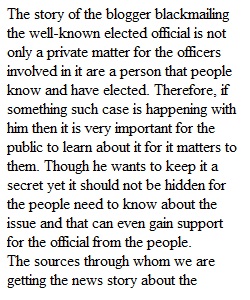


Q In this two-part assignment, you'll take on two roles: First, as a reporter pitching a sensitive political story to an editor; second, as the editor responding with her/his decision on whether or not the story will be published. A key element of the assignment is to apply libel law, particularly from Times v. Sullivan, to editorial decision-making. 1. The assignment: As a reporter, you've gathered information that a blogger successfully blackmailed a well-known elected official. You have three sources who know the politician personally, all of whom say the blogger threatened to publish information about the politician's spouse, who is allegedly battling drug addiction. According to your sources (all of whom wish to be unnamed), the politician paid $100,000 to the blogger to withhold the story. In your memo to your editor, argue: --Why it's important to publish this story. --Why your sources should remain unnamed. --Why you feel confident that your publication could successfully defend a resulting libel suit. 2. Now switch roles and write a response to the reporter as the editor. Will you allow the story to be published? Why or why not? Focus on legal and ethical issues, as well as the watchdog function of the American press.
View Related Questions